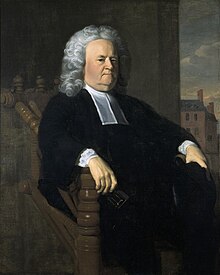Edward Holyoke
| Edward Holyoke | |
|---|---|
 |
|
| President of Harvard College | |
|
In office 1737–1769 |
|
| Preceded by | Benjamin Wadsworth |
| Succeeded by | John Winthrop acting |
| Personal details | |
| Born |
June 26, 1689 unknown |
| Died | June 1, 1769 (aged 79) unknown |
Edward Holyoke (June 26, 1689 – June 1, 1769) was an early American clergyman, and the 9th President of Harvard College.
Edward Holyoke was the son of a wealthy and influential businessman, Elizur Holyoke Jr, who held several local town offices and served in the legislature. He is also the grandson of Elizur Holyoke Sr., of Springfield, Massachusetts — notable due to the fact Mount Holyoke and Holyoke, Massachusetts are attributed to him.
Edward was educated at North Grammar School, Boston, and then went directly to Harvard College, graduating in 1705 at age 16, he also gave the class' Bachelor's Oration. While at Harvard, Holyoke “had had the distinction, as an undergraduate, of having more fines and black marks recorded against his name for breaches of discipline than any student of his day. In 1708, he received his M.A from Harvard College. From 1709-1712 he was the Librarian at Harvard and between 1712-1716 he was a tutor (instructor), and (1713 - 1716) he was a Fellow of the Corporation (Harvard).
In 1714 he also became a candidate for colleague pastor with Rev. Samuel Cheever of Marblehead, but the majority of the church favored another candidate. The minority that favored Holyoke withdrew and formed a second church which Edward was ordained as pastor for the Second Church of Marblehead on April 25, 1716, and he served the Second Church of Marblehead for 21 years.
In 1736, he was appointed and then approved by Governor Belcher as the choice as President of Harvard College. The General Court agreed to pay Marblehead Society 140 pounds "to encourage and facilitate the settlement of a minister there ..." Holyoke became the 9th President of Harvard College (1737–1769), succeeding after Benjamin Wadsworth death. Holyoke's administration began during the religious revivals of the Great Awakening and lasted until the revolutionary controversy with England was entering its final phase. He immediately gained notoriety with his election-day sermon delivered before the Governor and General Court in which he boldly declared:
“All forms of government originate from the people . . . As these forms have originated from the people, doubtless they may be changed whensoever the body of them choose, to make such an alteration.”
and as a liberal in politics, Holyoke was also an eloquent spokesman of new spirit of toleration that was softening the strict tenets of New England Calvinism. To minister or pastors, he had insisted on occasions, that governments ;
...
Wikipedia
